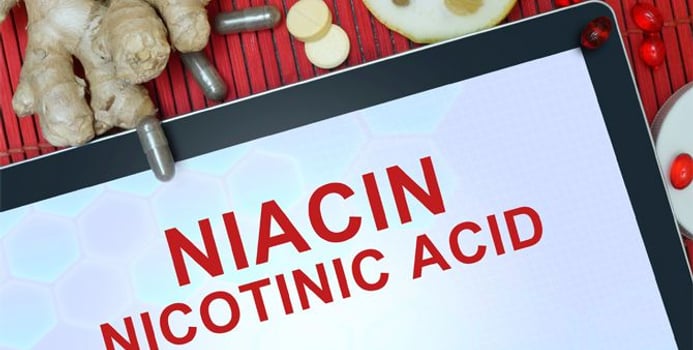Niacin, also known as vitamin B3, aids in digestion, converts food to energy, helps your body make hormones, is necessary for healthy hair and skin, and is essential for proper nerve function. Niacin is present in many multivitamin supplements and is abundant in meat, fish, eggs, milk, yeast, grains, beans and green vegetables. While niacin is an essential nutrient your body requires daily, getting too much niacin can be problematic.
Niacin RDA
The Niacin recommended dietary allowance, or RDA, is 16 milligrams for men, 14 milligrams for women, 18 milligrams during pregnancy and 17 milligrams of niacin daily for breastfeeding women, notes the Institute of Medicine. RDAs are estimated to meet the nutrition requirements of 97 to 98 percent of individuals in each population group, and should be treated as minimum daily needs.
Symptoms of Deficiency
Consuming too little niacin on a regular basis can lead to unpleasant side effects and health problems. These adverse effects may include vomiting, diarrhea, canker sores, fatigue, indigestion, cracked scaly skin, a swollen bright red tongue, a burning sensation in your mouth, forgetfulness and depression, according to the University of Maryland Medical Center. If you're experiencing any of these symptoms, see a doctor who can determine if you do indeed have niacin deficiency. If so, boost your intake of niacin-rich foods and take a niacin supplement as recommended by your doctor.
How Much is Too Much?
While it's unlikely you'll ingest too much niacin by eating niacin-rich foods, taking high doses of niacin supplements can lead to toxicity. The Institute of Medicine notes the tolerable upper intake level, which is the highest amount unlikely to cause health problems, is 35 milligrams of niacin daily. The University of Maryland Medical Center notes that taking doses of 50 milligrams of niacin or more daily can cause side effects, such as burning and tingling in the face and chest, red flushed skin, stomach ulcers and liver damage. It can also interact with certain medications.
Benefits of Prescription Niacin
Taking high doses of niacin in the form of prescription medications may help improve high blood cholesterol. Some of these cholesterol-lowering products contain up to 500 milligrams of niacin, according to MedlinePlus. The University of Maryland Medical Center notes that taking aspirin 30 minutes before high doses of niacin can help prevent skin flushing. However, because niacin can interact with other medications and cause unpleasant or dangerous side effects, never ingest large amounts of niacin without consulting with and being monitored by a doctor.
An experienced health, nutrition and fitness writer, Erin Coleman is a registered and licensed dietitian and holds a dietetics degree from the University of Wisconsin-Madison. She also has worked as a clinical dietitian and health educator in outpatient settings. Erin's work is published on popular health websites, such as TheNest.com and JillianMichaels.com.



